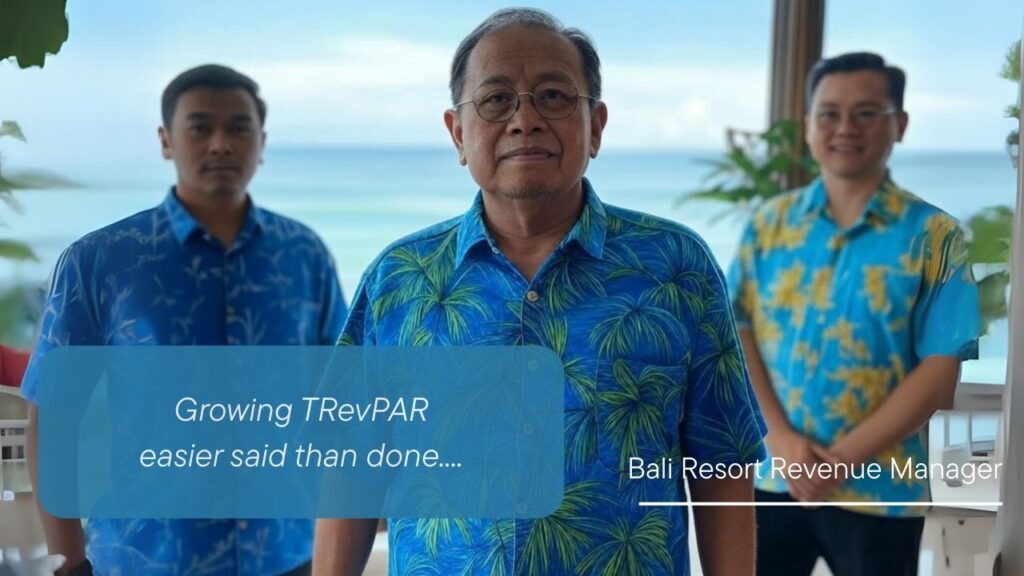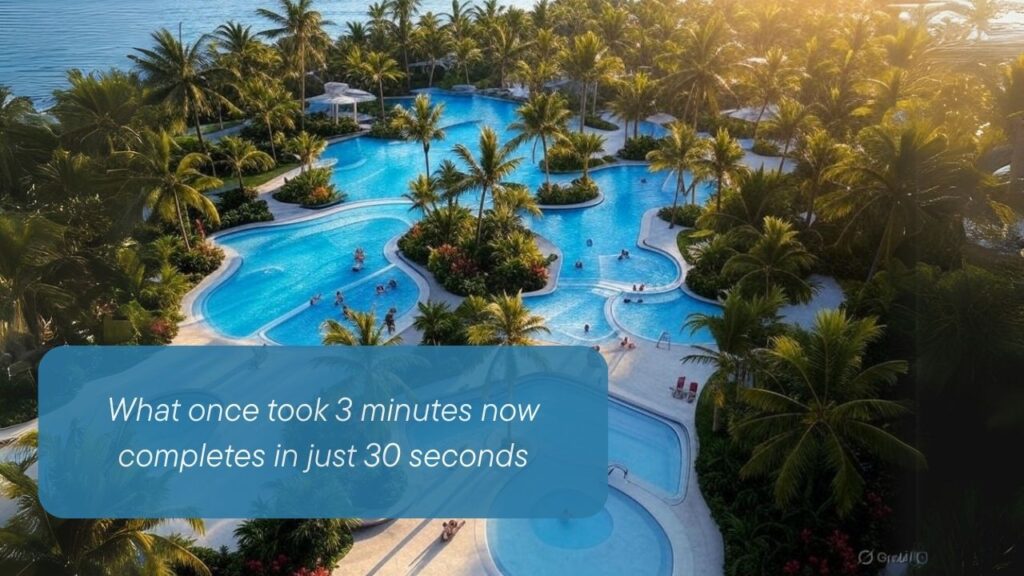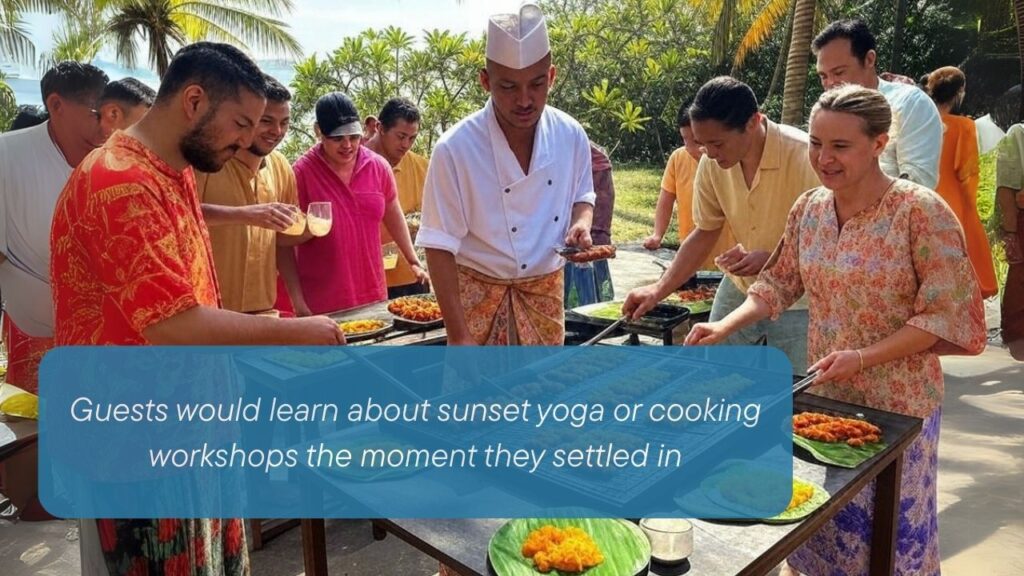Let’s starts with a story.
“I took over the position at this 90-acre resort two years ago. The view is fantastic—cliffside villas, infinity pools, sunset bars. Guests never complain about that.
But what bothered me was how little they engaged with everything else.
Spa bookings were inconsistent. In-room dining had potential but underperformed. Even activities like yoga sessions and floating breakfast barely moved the needle.
Growing TRevPAR (Total Revenue Per Available Room) became my biggest headache—especially during the low season, when every upsell counts.“
5 years, Bali Resort Revenue Manager

The Challenge of Large Resorts
Large resorts face the same issue with their service coverage, and when it comes to upsell, the challenge only gets harder—guests are spread out, touchpoints are inconsistent, and staff are often too busy handling basic requests to promote anything beyond what’s already booked.
You can have the best spa, the most scenic dining spots, or curated experiences ready to go, but if no one mentions them at the right moment, they go unnoticed—and unbooked.
“Is the pool available after 5?”
—Questions Like These Are Now Handled by AI, Cutting Calls by 67%
As modern travelers increasingly expect instant, on-demand service, hotels and resorts are asking an important question: how can they meet guest needs without overwhelming their staff? For many, the answer lies in the growing role of Voice AI technology.
Solutions like Aiello One have shown that transformation doesn’t require an overhaul to make a big impact. In some cases, properties have seen call volume drop by 67% in just three months—simply by letting an in-room AI voice assistant handle the most common guest questions.
Instead of dialing the front desk, guests can now just ask, “What time does the bar open?”, “Can I book a buggy?”, “What’s today’s yoga schedule?”, or “Is the spa open after 5?” These repetitive yet time-consuming queries are automatically answered by the AI assistant, freeing up staff to focus on what really matters.
With the phones ringing less, concierge teams now have the breathing room to promote high-value offerings like Hatha yoga sessions or the Herbal Juice Experience Package—turning saved time into real revenue opportunities.
This isn’t just about adopting new technology; it’s about reimagining service delivery. By using smart tools to reduce staff workload, hotels can unlock their teams’ full potential and elevate the guest experience—all at the same time.
No More Messengers for Relaying—Task Efficiency Up by 83%
At the resort, requests used to bounce between teams—guests would call for a buggy or water, and staff would spend minutes passing the message along. It added up fast.
Now, with Task Management Pro, guest requests made through the in-room voice assistant are sent directly to the system—automatically routed to the right staff and acknowledged in under 30 seconds.

From First Click to Check-In: How AI is Personalizing the Guest Journey
There’s something magical about welcoming couples on their honeymoon, anniversary, or a surprise getaway. But in many hotels and resorts, that magic gets delayed—because the front desk doesn’t always know the story behind the reservation until guests arrive.
That’s changing with the help of conversational AI.
With tools like Aiello’s GuestWeb, an AI chatbot built directly into the hotel’s website, properties can start learning about their guests long before check-in. Guests often ask pre-arrival questions like, “Do you offer honeymoon packages?” or “Can we book something romantic?”—and in response, the chatbot suggests tailored experiences instantly.
By the time the guest arrives, the team already knows what they’re celebrating. Instead of asking the usual questions, staff can jump straight to recommending something meaningful—like a private dinner under the stars, or a surprise floral arrangement waiting in the room. That extra touch turns a stay into a memory.
What’s more, GuestWeb doesn’t require an app download—a welcome relief for many travelers. Guests can use it during their stay to make restaurant reservations or sign up for water activities like paddleboarding, all in their preferred language.
Hotels are also enhancing the experience further by using in-room voice assistants to promote special offers in real time. From sunset yoga to hands-on cooking workshops, guests hear about unique events right when they settle in. It feels natural, not forced—just the right nudge toward a better experience.
In today’s competitive hospitality market, this kind of proactive personalization not only delights guests—it gives hotels a clear edge.

Listening at Scale: How AI is Helping Hotels Care Smarter
In the past, guest service was mostly one-on-one—every question, every request handled through a direct call or face-to-face interaction. While personal, this model can quickly overwhelm staff, especially during busy hours.
Today, hotels are discovering a more scalable way to care for their guests. With the rise of in-room AI voice assistants and chatbots, what used to be a one-to-one interaction has evolved into a one-to-many system. Guests simply speak to the voice assistant in their room, and their requests—whether it’s fresh towels or a dinner reservation—are instantly routed to the right department.
The result? Faster service, less pressure on the front desk, and smoother coordination across teams.
Beyond support, AI is also helping hotels gently promote activities and experiences without needing extra manpower. Voice assistants and chatbots can introduce guests to spa specials, paddleboard lessons, or local tours—all in the flow of natural conversation. And because these tools are proactive yet unobtrusive, guests feel informed, not sold to.
It’s not just about automation—it’s about making service more intelligent, more efficient, and ultimately, more human.
When Data Starts to Speak: The Hidden Value of Guest Insights
Speed and sales are obvious wins when implementing AI-powered tools—but the real magic lies in the insights they uncover.
By capturing everyday guest interactions through voice assistants and chatbots, hotels are starting to see patterns they never knew existed. One unexpected example? A noticeable number of guests in their 70s asking for soothing lotion after beach activities. A small detail on the surface, but a powerful clue about guest needs.
These are the kinds of insights that don’t show up in spreadsheets or post-stay surveys. They emerge naturally from real-time conversations—and they open the door to new offerings, better personalization, and smarter service decisions.
Your team can do this too.
Talk to us.

